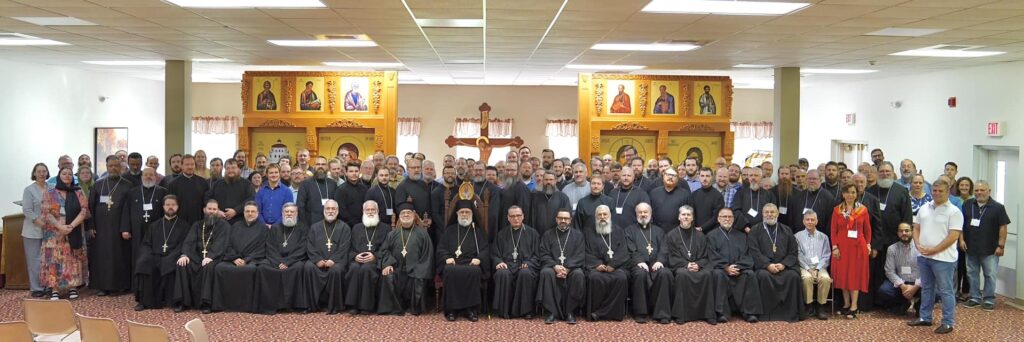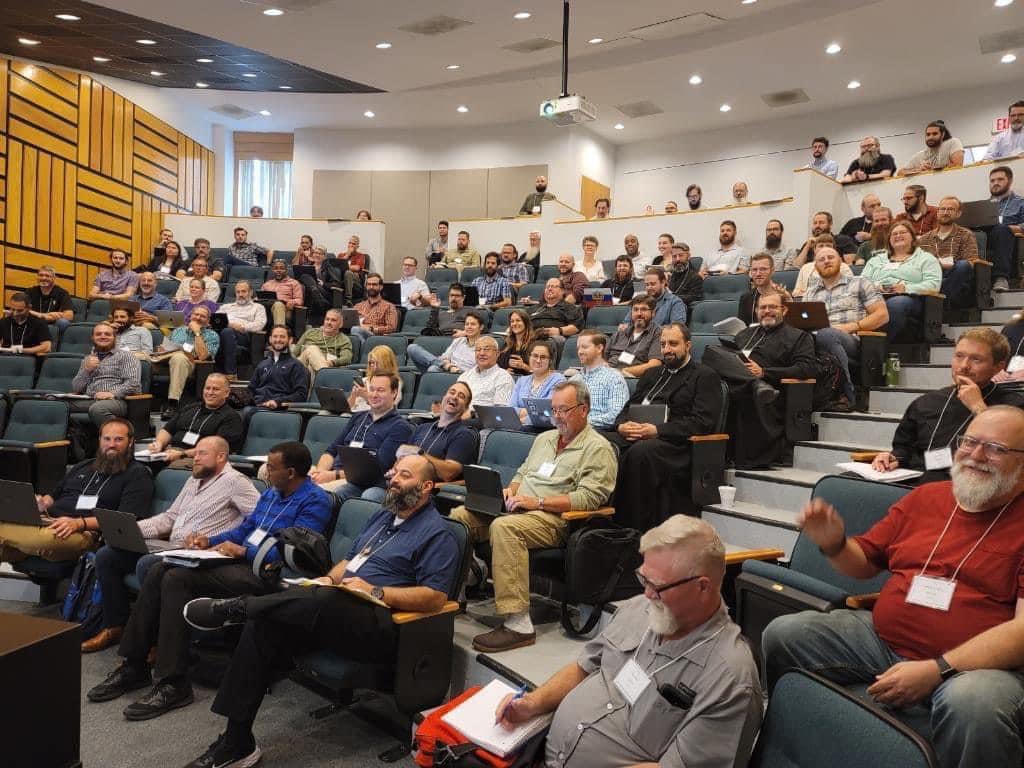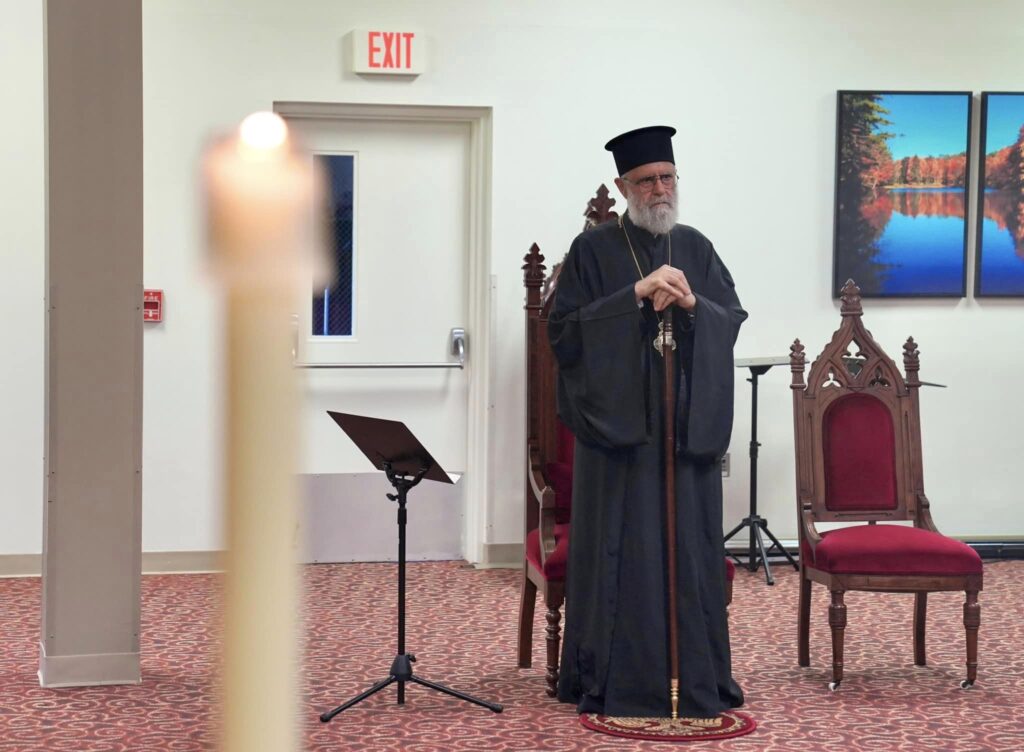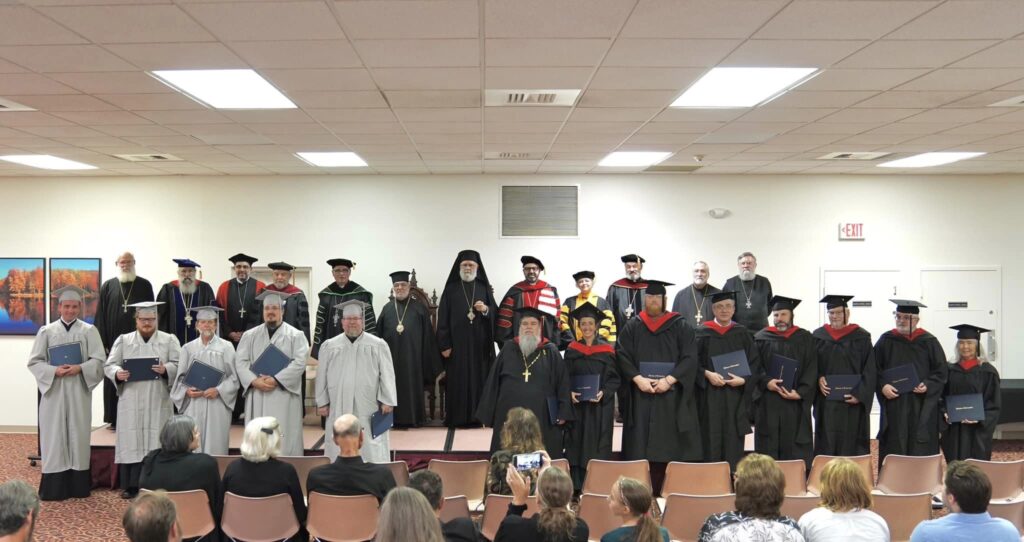August 2025 — The Antiochian House of Studies (AHOS) celebrated its 2025 Graduation Ceremony with reverence, joy, and thanksgiving, honoring the accomplishments of students who completed degrees in the Master of Divinity (MDiv), the Master of Theological Studies (MTS), and the St. Stephen’s Certificate in Applied Orthodox Theology.

The day began with an opening procession led by Fr. Fadi Rabbat, followed Gospel and chanting. Fr. Elias G. Boulos warmly welcomed all gathered before His Eminence Metropolitan SABA offered the opening blessing. The AHOS Choir lifted the congregation with the Troparion of Pentecost, preparing hearts for the academic reflections and addresses that followed.
Below are the full texts of the speeches by Metropolitan SABA, Fr. Michel Najim, Fr. Fadi Rabbat, and Deacon John Bean [Class of 2025 Representative], as well as the complete list of 2025 AHOS graduates,
Graduation Ceremony video recording
Messages from AHOS Leadership
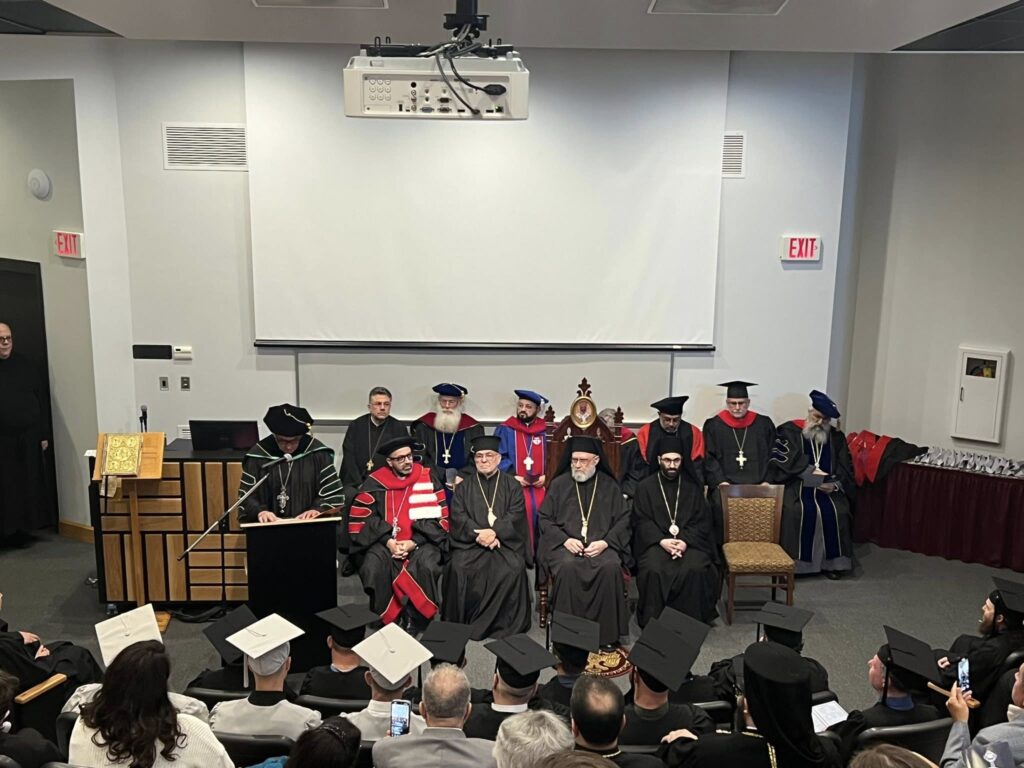
In his President’s Address, Fr. Michel Najim reminded graduates of the sacred purpose of their studies, emphasizing that theology is not simply an academic pursuit but a spiritual calling. “We are not here merely to produce scholars,” he said. “Our mission is to form servants of the Church who live the faith, not just study it.”
- Below is the full texts of the speech by Fr. Michel Najim
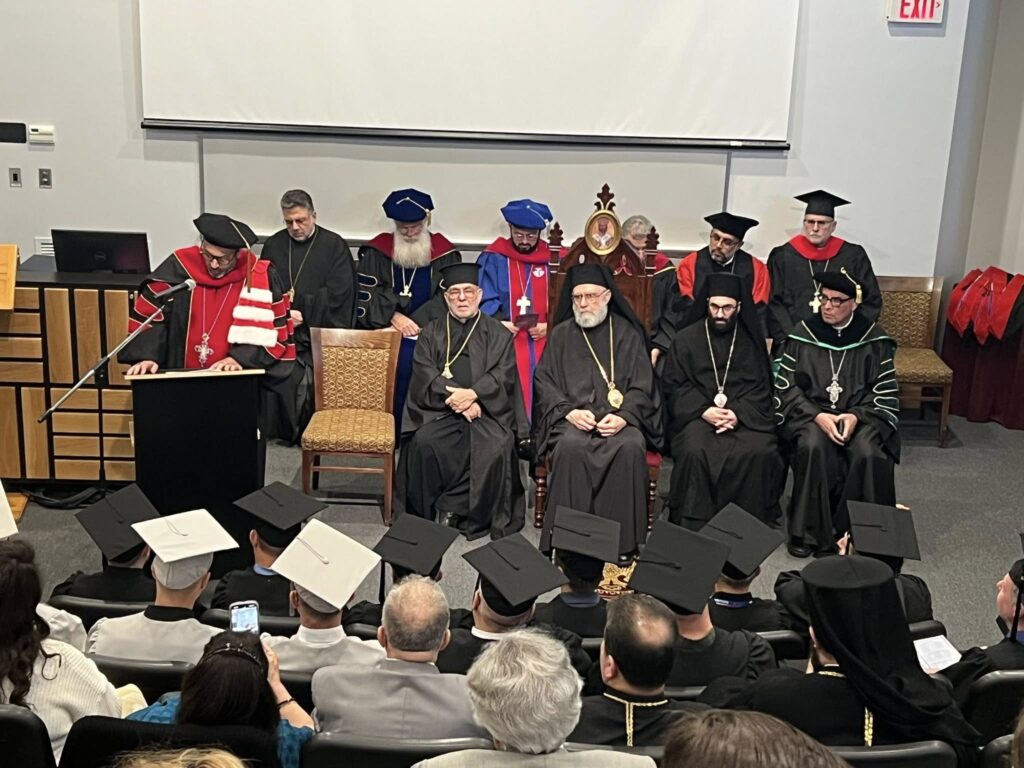
Following him, Fr. Fadi Rabbat, Academic Dean, highlighted the lifelong journey of theological education. “Graduation is not an end,” he stressed, “but the beginning of a deeper commitment to learning, to prayer, and to the pastoral life. What you carry forward is not a diploma but a responsibility.”
- Below is the full texts of the speech by Fr. Fadi Rabbat
Metropolitan SABA’s Address
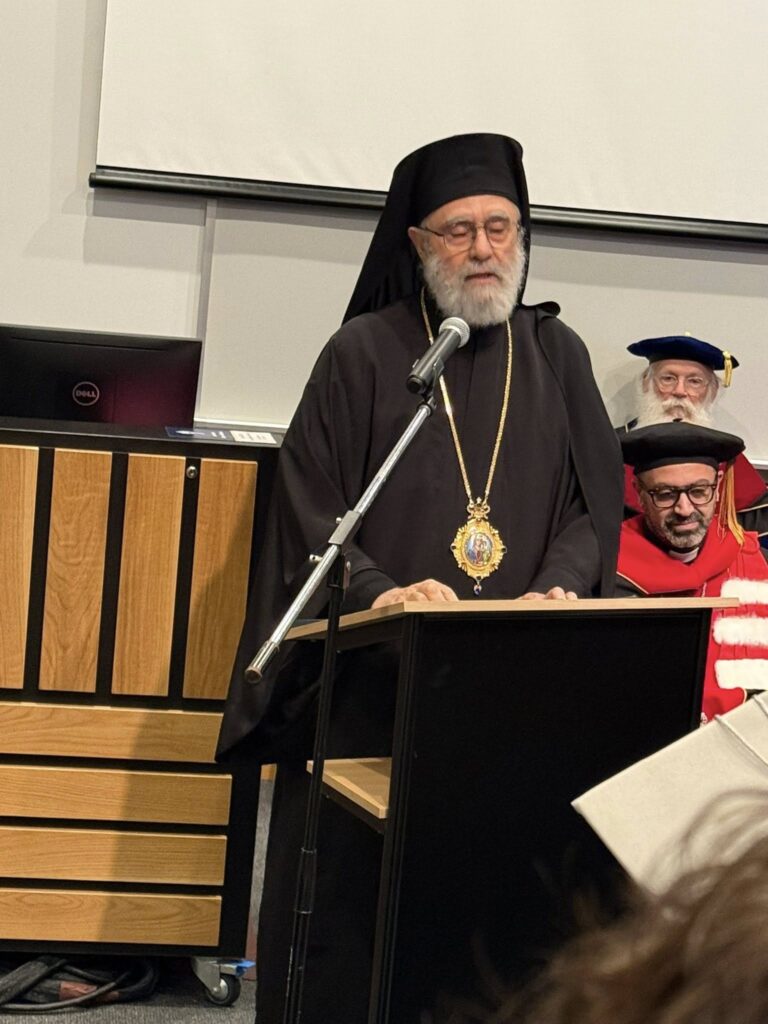
Speaking from the heart, His Eminence Metropolitan SABA offered an inspiring message, emphasizing that theology is not simply an academic discipline but a living encounter with the Living God. He reminded the graduates that true theology must be united with prayer, humility, and experience:
“Theology is not a desert; it is a science about God, about God’s truth. Yet if one enters into the study of God without living in God’s truth, theology remains only at the level of the head. What matters is living and experiencing God.”
His Eminence drew on the teachings of Metropolitan Kallistos Ware and Vladimir Lossky, underscoring that theology and prayer are inseparable, and that the responsibility of a theologian is to live what they preach. He called on the graduates to be “true witnesses of the spirit of Antioch,” not with pride, but with honesty, purity, and goodness.
- Below is the full texts of the speeches by Metropolitan SABA
Student Reflections and Keynote Address
Representing the graduating class, Dn. John Bean spoke on behalf of his peers, reflecting on the years of study, fellowship, and spiritual formation. He expressed gratitude to the faculty, hierarchs, and families who supported the journey, affirming the class’s commitment to serve Christ and His Church with humility and love.
- Below is the full texts of the speech by Deacon John Bean
His Eminence Metropolitan SABA then returned to the podium as the Keynote Speaker, further encouraging the graduates to embody their calling through prayerful living and pastoral witness.
Conferment of Degrees
Following the addresses, the Troparion of the Dormition was chanted before Metropolitan SABA again addressed the graduates. The program continued with the Conferral and Presentation of Degrees by His Eminence Metropolitan SABA, Fr. Michel Najim, and Fr Fadi Rabbat, jointly with Fr. Elias Boulos, and Fr. Patrick Viscuso, awarding diplomas to students completing the Master of Divinity (MDiv), the Master of Theological Studies (MTS), and the St. Stephen’s Certificate in Applied Orthodox Theology.
Closing Blessing
The ceremony concluded with the Troparion of the Holy Cross and the closing blessing by Rt. Rev. Bishop THOMAS, sending forth the graduates to serve the Church and the world.
A Day of Gratitude and Hope
The 2025 Graduation at the Antiochian House of Studies was not only an academic milestone but also a spiritual celebration of vocation, prayer, and witness. As the graduates now step forward into ministry and service, they carry with them the exhortation to live as men and women of prayer, grounded in the mystical and living tradition of the Orthodox Church.
For the full texts of the speeches by Metropolitan SABA, Fr. Michel Najim, Fr. Fadi Rabbat, and Deacon John Bean [Class of 2025 Representative], as well as the complete list of 2025 AHOS graduates,

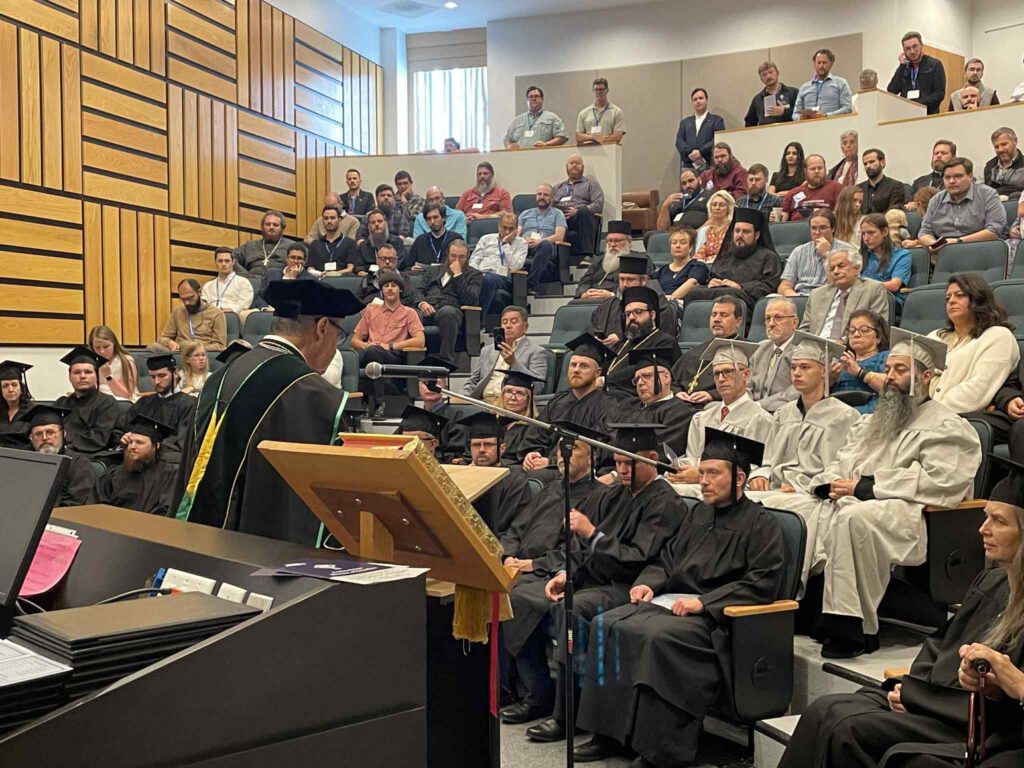
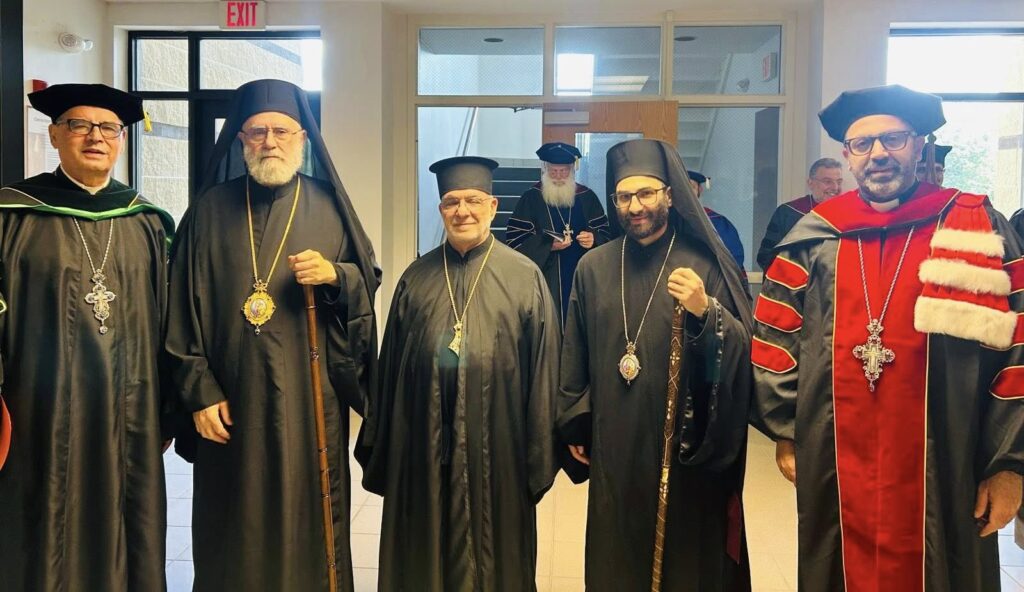
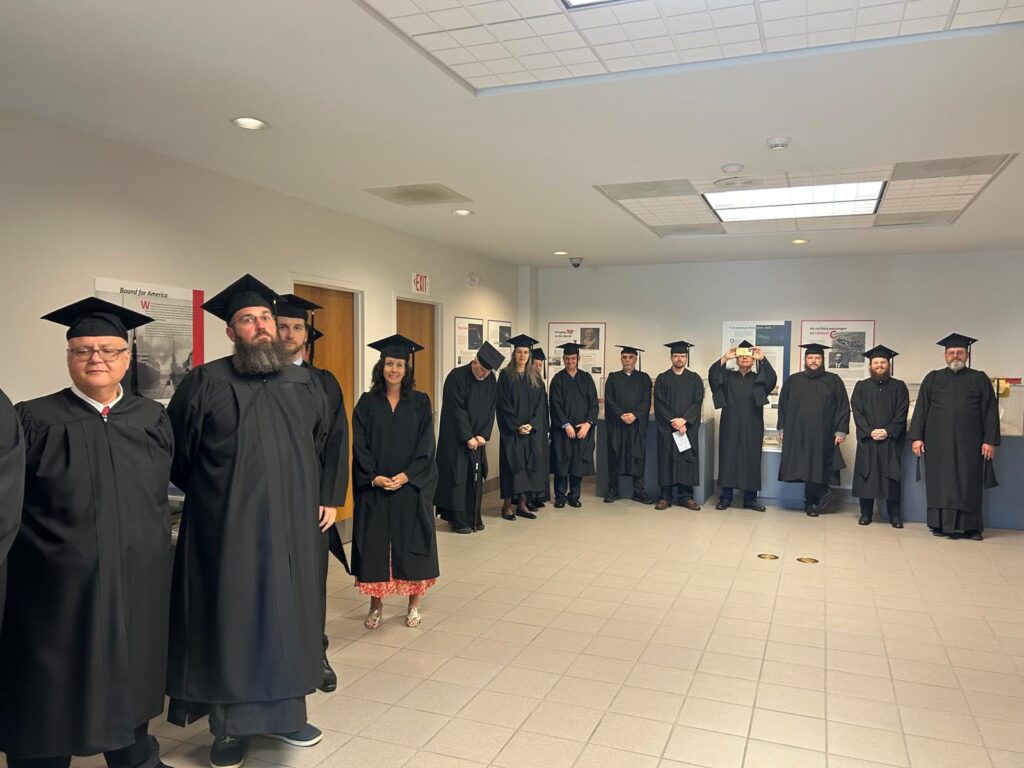
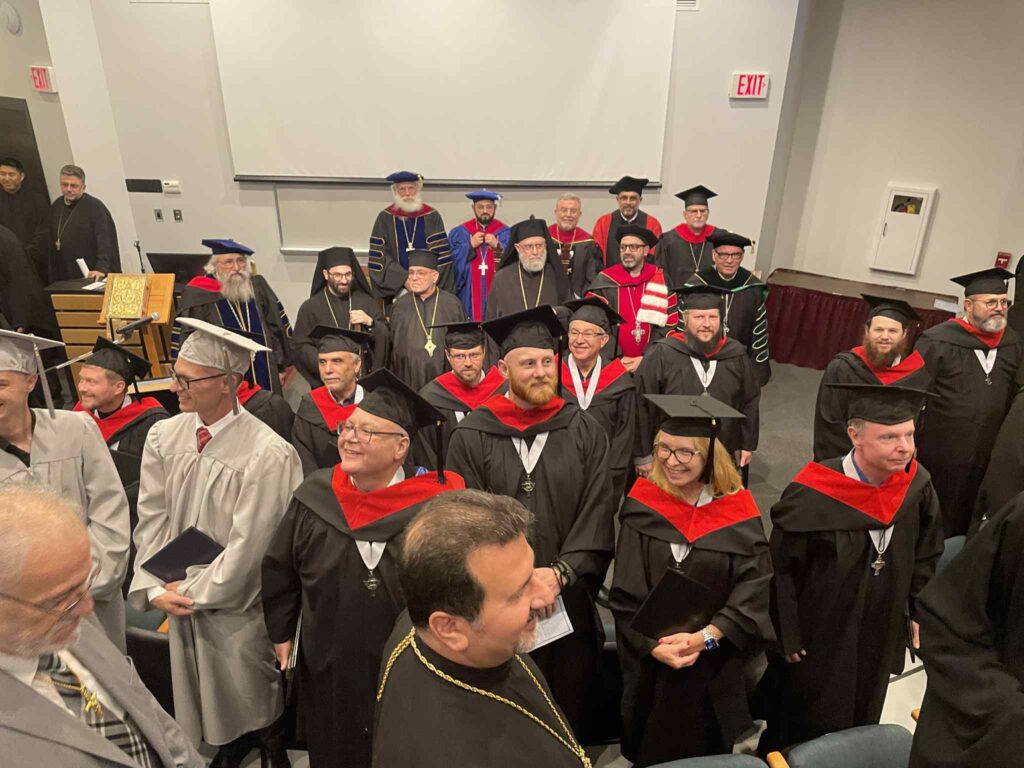
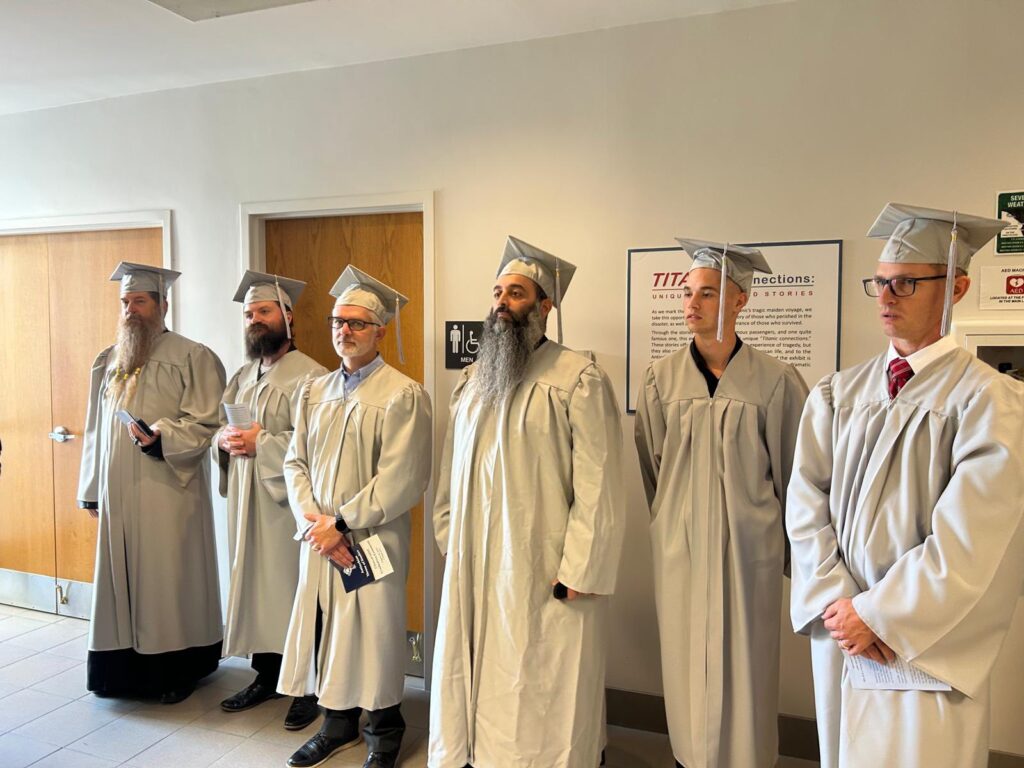
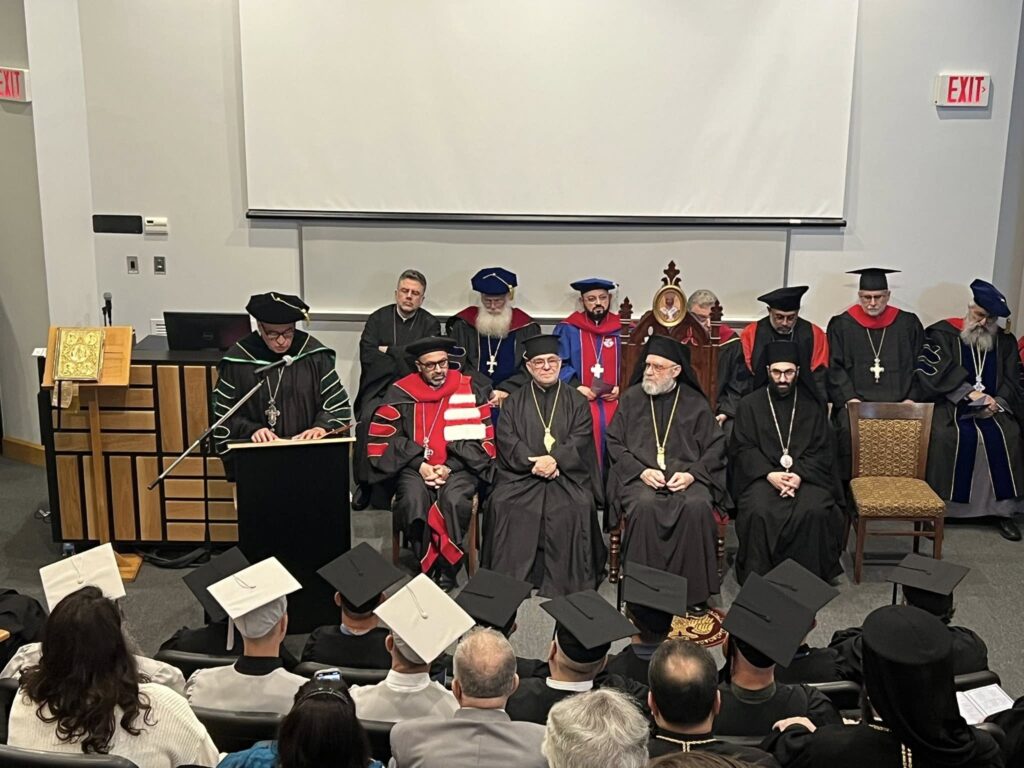

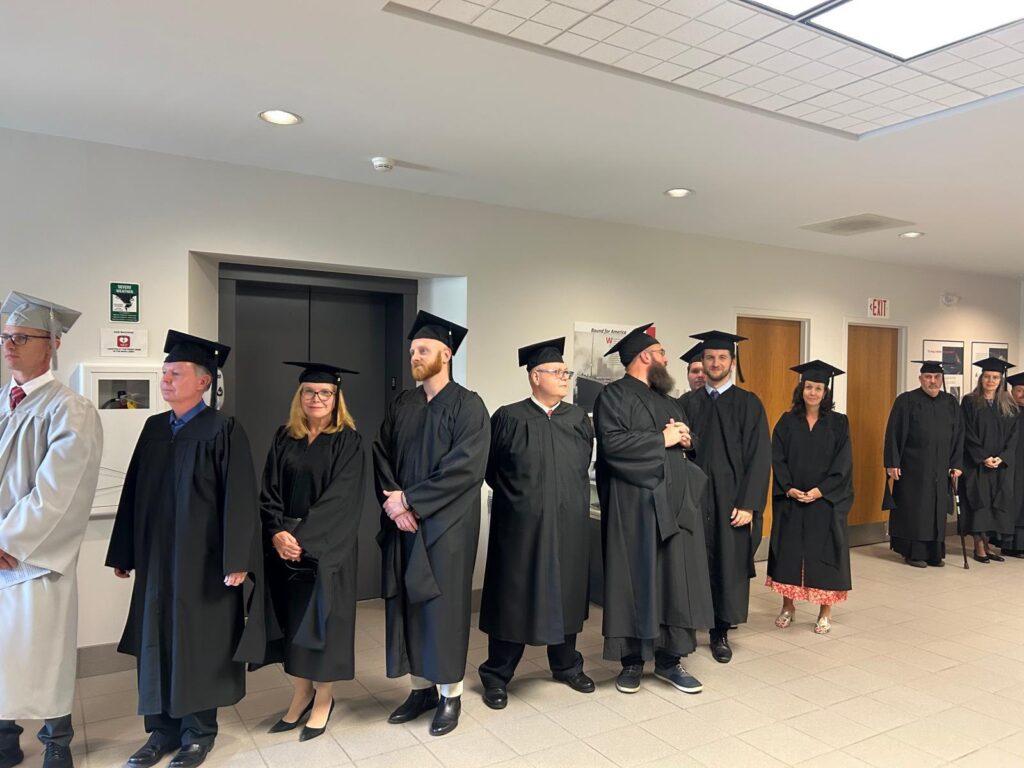
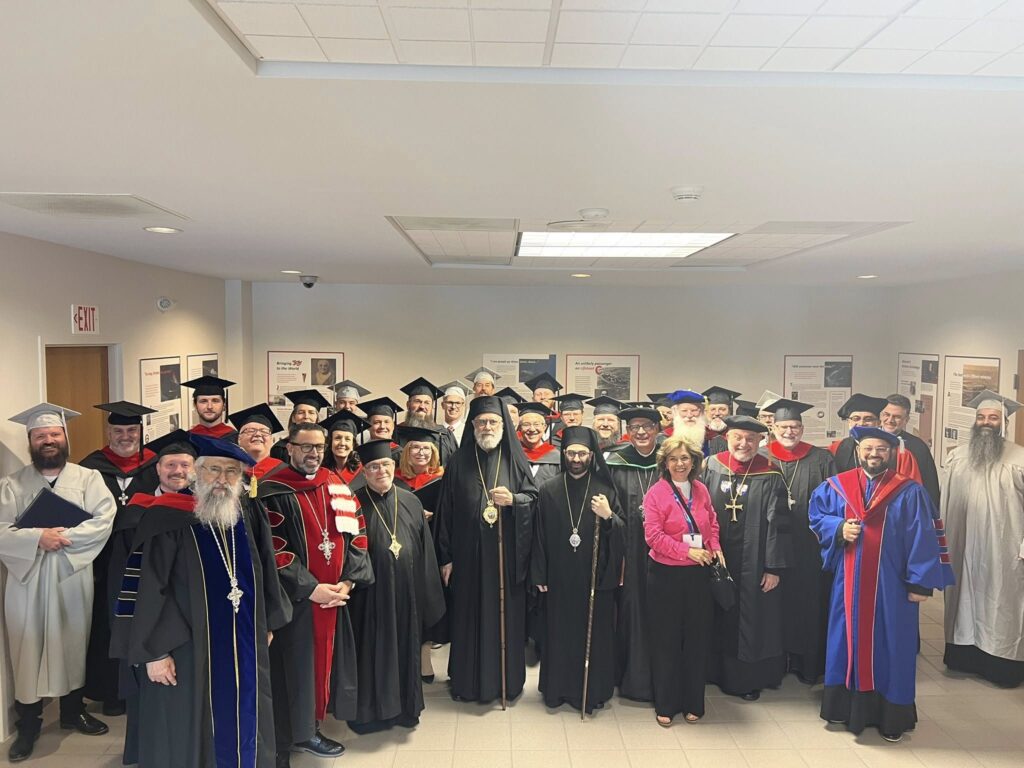
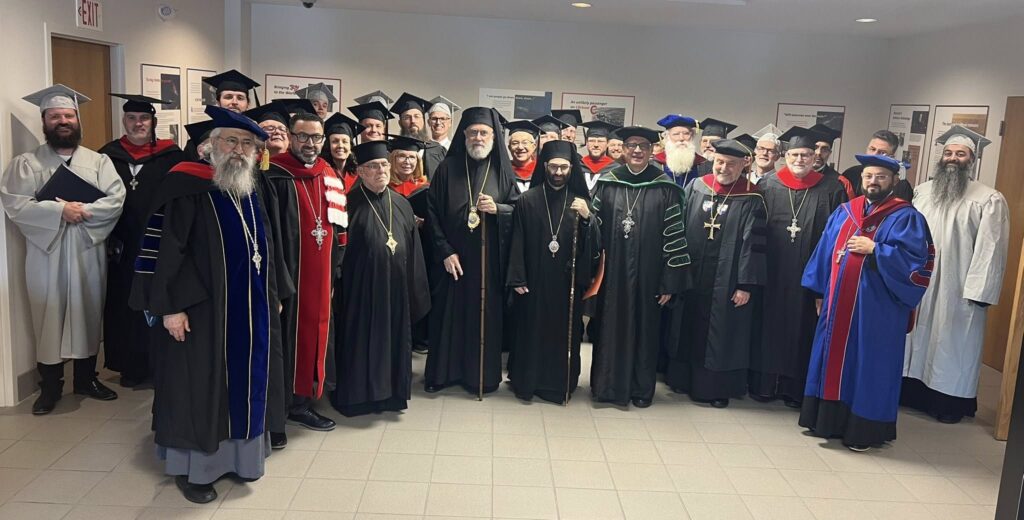

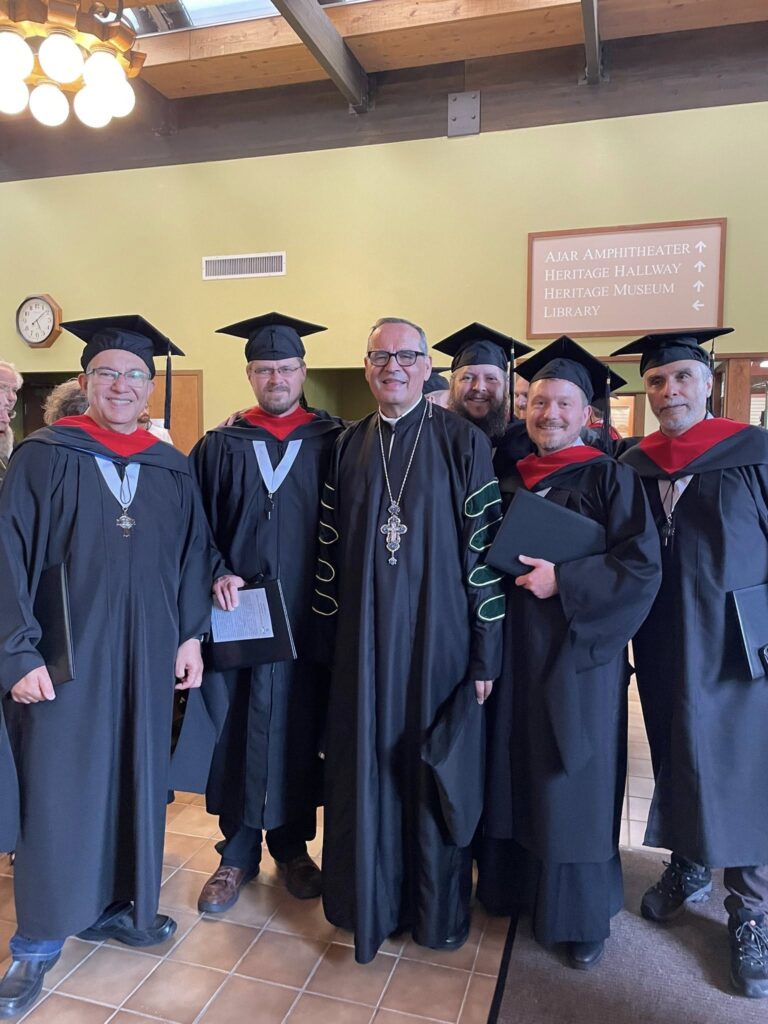
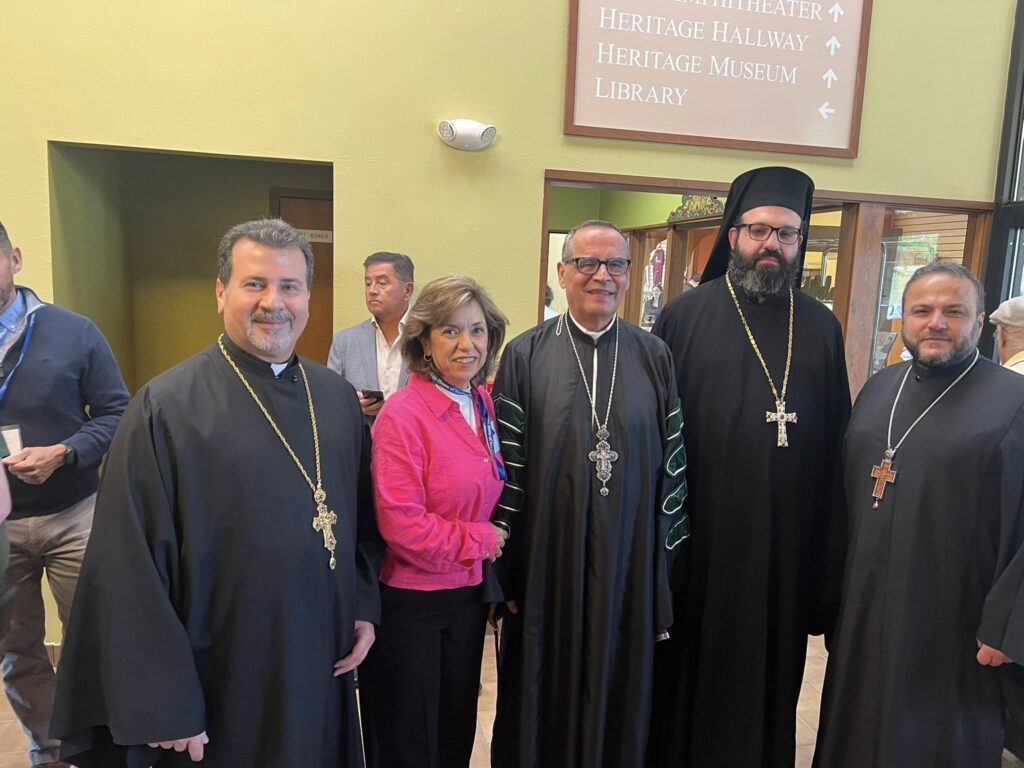
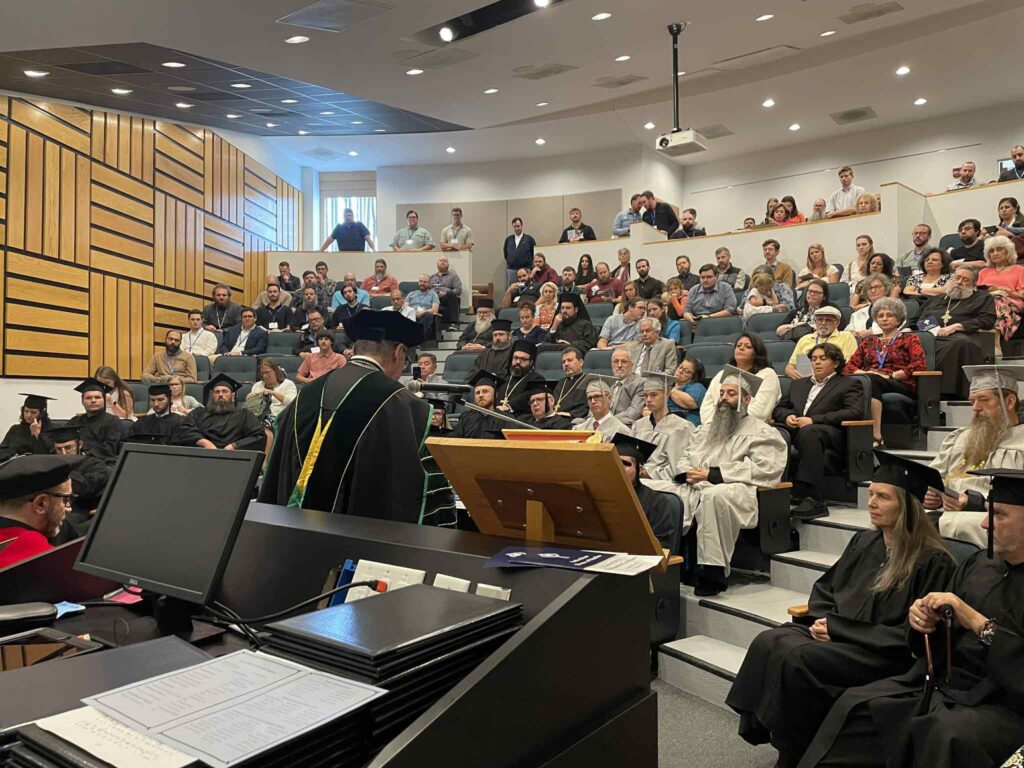

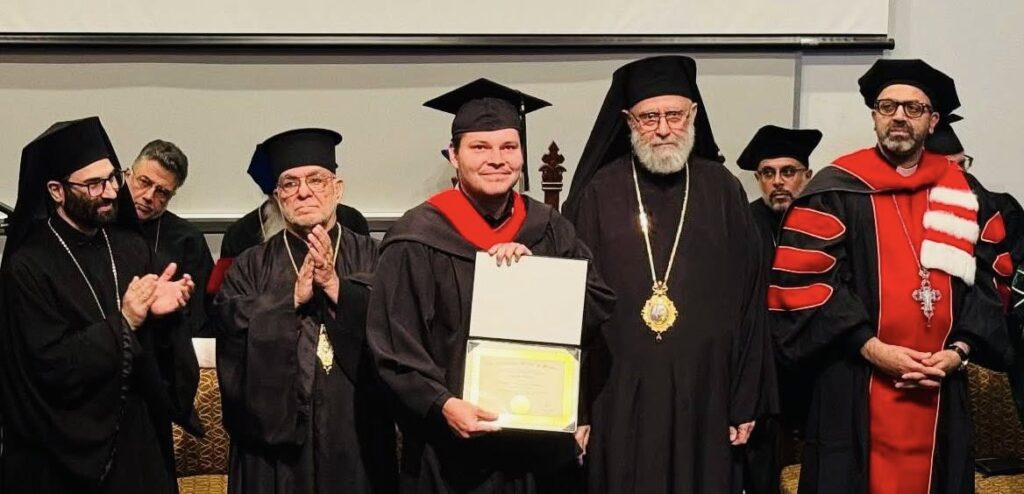
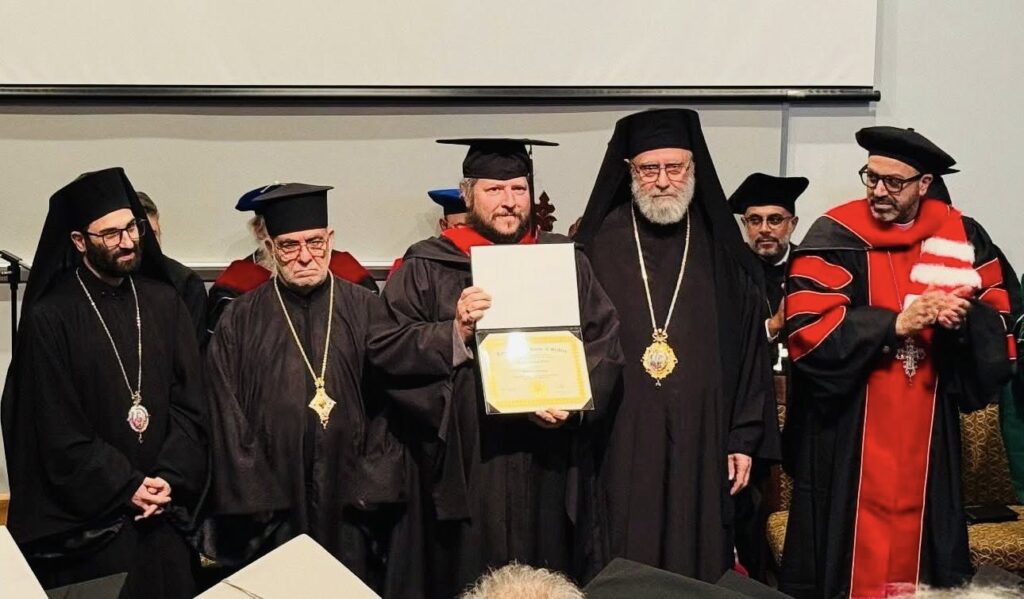
His Eminence Metropolitan SABA Speech
Your graces, brothers, Bishop Thomas and Bishop Theodore, my beloved all the Reverend Fathers, President, new teachers, fathers of the family of Elms, my beloved. When Father Michel talked with me about the commencement, I thought to myself, what should I write? Then, after I prayed, I didn’t write. Why? Because I want to talk with you, but God inspires me. Of course, I put some points in my mind, but I don’t want today to read; I want to talk with you. We are in an academic institute called AHOS, where we study theology. Theology is a science of God. When we say science, we mean it is a discipline through which we study—similar to psychology, biology, or zoology—but theology differs because we, as priests, as Christians, as teachers, need not only to know about God but to live with God. Why do we study about God? Do we study just to be teachers, to be professors, to know more? That is not bad, but as Christians, we should study theology because we want to know more about God to live with Him and to understand how to live with Him. Theology is not a desert; it is a science about God, about God’s truth. Yet if one enters into the study of God without living in God’s truth, exploring Him only through the mind, reason, or reading, theology remains at the level of the mind, at the level of the head. The danger is closing oneself within one’s system, thinking that knowing much makes one great, but the more we know, the more responsible we are, and the more accountable we become.
God, in our Orthodox faith, is not the God of our theological constructs or systems. He is the Living God, a person who enters into relationship with those who cry out to Him sincerely, humbly, and constantly. By intellectualistic rhetoric or logical preaching, we often go over people’s heads instead of offering a simple homily, like a mother’s words to her child, which can be understood and expresses personal experience with God. In the Orthodox Church, we must critique ourselves. We know many beautiful things about God; we teach high theology, principles, and constants, which is fantastic, but what matters is living and experiencing God. There is often a gap between what we know, what we preach, and what we actually live. We talk about concepts, but not always how we embody them. Many people do not like to hear sermons because they are not rooted in lived experience. If God acts in our life, His work will be visible.
I remember after the election by the Holy Synod, I wrote letters to the Archdiocese, to priests and my brother bishops. Initially, people were shocked because I addressed them as “my sons.” Where is our theology if we live with God yet cannot feel this presence? All knowledge without this awareness is meaningless. How do we live our Gospel? Studying and praying are essential, but we must also be men and women of prayer, living a life of prayer. Metropolitan Kalistos emphasized that studying theology should involve trust in research, writing, and teaching. Theology is a scholarly pursuit, requiring rigorous reasoning, but it is not detached like biology; personal commitment is vital. Vladimir Lossky also stressed the integral link between theology and spirituality, insisting that theology and prayer are inseparable. True theology, in his view, is ultimately mystical, and mysticism fulfills theory.
We must ask ourselves if we are ready to live as people of prayer, experiencing God in daily life. Quotations from Scripture, the Holy Fathers, or great theologians are helpful, but people are moved more by our lived experiences. Our experience with God should align with the teachings of the Church and Scripture. In America, people often speak of Holy Tradition, but not all can differentiate between unchanging Holy Tradition and local, temporal customs. We need people of God, guided by the Holy Spirit, to teach and bear witness. My prayer is that we live according to our mystical teachings in the Orthodox Church, experiencing purification, illumination, and divinity. Now you graduate from the Antiochian House of Studies. You have studied, listened, and learned about Antioch. I want you to be true witnesses of the spirit of Antioch, not proud of it. People need to see Antioch’s spirit through your honesty, purity, and goodness. Congratulations. God bless you. We are so proud of you.
Fr Michel Najim Speech [AHOS President]
Graduation Speech (2025)
Delivered at AHOS Commencement
Your Eminence, Your Grace, Dear graduates, esteemed faculty, beloved family, and all who gather with us today:
Upon the invitation of His Beatitude Patriarch Daniel of Romania, the relics of Saint John Chrysostom—his skull with the attached ear—were brought by Archimandrite Ephraim, Abbot of Vatopedi Monastery on Mount Athos, and placed in the Patriarchal Cathedral in Bucharest. From July 11 to 16, more than 60,000 faithful from across the country came to venerate Chrysostom’s relics. According to clergy and local authorities, as many as 7,000 people approached the relics every four hours.
Abbot Ephraim bore the head of the founder of the School of Antioch—sanctified, luminous, and embodying one of the finest expressions of theology. In the Antiochian house of study, you are blessed by his teaching and by the witness of all like-minded Fathers throughout the history of Christianity.
Dear graduates, today marks a sacred moment—a consecrated beginning. You stand at the threshold of an uncharted future, carrying within you the mind of the Fathers. You bear the imprint of formation in the Patristic tradition—a tradition not of mere information, but of interior transformation and divine transfiguration.
You have not simply studied the fathers; you have, in some measure, internalized their witness. You have been blessed by the presence and blessings of his Eminence Metropolitan Saba, his Grace bishop Thomas, and his grace bishop Theodore and guided by wise and faithful professors—not only through their teachings, but more profoundly through proclaiming the mind of the Fathers. Through them, you have been shaped into seekers of sanctity and holiness.
Yet as you graduate, you step into a secular landscape that offers ease without depth, opinions divorced from truth, and gratification stripped of enduring meaning. You live in an age that is often content with a “Christ” of sentimentality but forgets the Christ whom Chrysostom proclaimed—the Physician of our souls and bodies, whose wounds heal and whose light transfigures.
Orthodox Christianity is not an ideology. It is the healing of the human person—the purification of the heart, the renewal of the mind, and the union of man with the uncreated energies of the Triune God. Holiness, in the Orthodox tradition, reveals that genuine life is found in sacrificial love.
Forget not: the holy person is often persecuted, as Chrysostom was—not only by the secular society, but also by distorted forms of religiosity, by the idolatries of political religion and the politics of religion alike.
Beloved graduates, your vocation is to become like-minded with John Chrysostom the head of the Antiochian School—not to be engineers of spiritual content or marketers of theological language, but to be priests, deacons, theologians and teachers—whole, transfigured, radiant with the likeness of Christ. You are called to be bearers of the divine mind—not as theorists, but as witnesses and living icons of the Kingdom of God.
John Chrysostom reposed in the year 407, and now after 1,618 years his relics remain a great blessing to myriads of people. You are blessed and fortified with the wisdom of Saint Chrysostom, the head of our school. You are sent to proclaim that man is fashioned for communion with God, not through ideological systems, but through the grace of divine energy and uncreated love.
Let us then become persons of flame—kindled by the fire of the Holy Spirit, courageous enough to love deeply, to suffer for Christ’s sake, and to live truthfully. And know this: you are not alone. Christ is within you, He who descends into our brokenness and confusion, and who calls each of us into the fullness of life.
The Holy Spirit accompanies you as Comforter and Sanctifier—the power who fills, heals, and hallows your every step.
Go forth, then, with the mind of John Chrysostom and with his sacrificial love. And may your life bear luminous witness to the truth that alone makes people holy through your ministry.
Congratulations—and may the blessing of the Lord be upon you always.
Fr Fadi Rabbat speech [AHOS Academic Dean]
Your Eminence Metropolitan Saba, Your Graces Bishop Thomas and Bishop Theodore, Your Reverence, Fr. Michel Najim, AHOS President, Beloved Concelebrants and Brothers, Professors, and Faculty, Dears in Christ, We stand at the threshold of a turning point—entrusted with a sacred lineage, welcomed into the Antiochian House of Studies, and invited to carry forward a radiant witness from this hall to the world. Today, St. Peter—the chief of the Apostles and founder of our Antiochian Church—reminds us that, like living stones, we have been built up into a spiritual house, a holy priesthood, to offer spiritual sacrifices acceptable to God through Jesus Christ. But what is a spiritual house, and how are we formed into a holy priesthood, offering sacrifices pleasing to God through Christ? The answer is simple, yet profound: oikos pneumatikos — οἶκος πνευματικός — “house of the Spirit.” It denotes any habitation of God in the Spirit, where His glory dwells and His power and grace are made manifest (Ephesians 2:22). It encompasses the Church, the Mystical Body of Christ, saturated by the Spirit and Power of God (1 Peter 2:5); the saints, the “household of God” (Ephesians 2:19); and, most intimately, our bodies, declared as “temples of the Holy Spirit” (1 Corinthians 6:19). In this living order, we are rocks upon which the praises of Him who called us out of darkness shall be proclaimed (1 Peter 2:9). This is the very heart of the priesthood: to render to God the sacrifice of praise, the offering of worship—the core of human existence. From the dawn of creation, we were made to be priests and kings, bearing dominion over the earth (Genesis 1:28). The vocation of priesthood is defined in Hebrews: “For every high priest is appointed to offer both gifts and sacrifices” (Hebrews 8:3). And so we offer, with every breath, the perpetual sacrifice of praise, thanksgiving and gratefulness: “Therefore by Him let us continually offer the sacrifice of praise to God, that is, the fruit of our lips, giving thanks to His name” (Hebrews 13:15). The word Eucharist comes from the Greek term “efkharisto” (Ευχαριστώ), which means “thank you”. We celebrated the Divine Liturgy to express our gratitude. A priest’s work is to make offerings to God with gratefulness. A sacrifice and an offering are one: the primary act is the surrender of all things to God, through Christ—the recognition that everything we have and are belongs to Him. This is the very center of our communion with God. In the Divine Liturgy the priest declares “Thine own of Thine own we offer unto Thee, on behalf of all and for all”. God is the source and owner of all gifts. We participate by offering back to God what he has entrusted to us. We offer what has been entrusted to us (gifts, prayers and the Eucharistic elements) in worship. Our priesthood remains holy as we remain in Christ and abide in His word, becoming a holy nation and His true disciples. Jesus declares: “If you abide in My word, you are My disciples indeed” (John 8:31). Merely memorizing, learning, or hearing the words of an AHOS teacher does not make one a disciple. One must be rooted in the teaching received, allowing the words of God to become one’s own words. The psalmist speaks with a heart burning for truth: “How sweet are Your teachings to my taste, sweeter than honey to my mouth” (Psalm 119:103). To live in Christ is to translate the teacher’s words into a life of transformation— “for in Him we live and move and have our being” (Acts 17:28). Remain in Him by abiding in LOVE—for God is love, and He acts in love. Our Lord gave us a vivid, practical sign: “…love one another; as I have loved you, that you also love one another. By this all people will know that you are My disciples, if you have love for one another” (John 13:34–35). How did He love us? He loved us to the point of death, “even death on a cross!” (Philippians 2:8). Be ready to love your brother in the same way, to bear your cross for him, to crucify your ego before him, for the cross reveals the infinite love of God for us. Be ready to lay down your life for your friends, as our Lord teaches: “Greater love has no one than this, than to lay down one’s life for his friends” (John 15:13). Beloved graduates, be a holy nation. Go in peace, become real priests, and make disciples not of yourselves but of Jesus Christ, teaching all that He commanded His Holy Apostles. Share with your neighbors the reservoir of God’s work within you—the experience of His love and the service it inspires. Love is service; the priesthood is service. Our Lord Jesus Christ is the Great Servant. We have walked with you in love and service to teach that Love is service, that Love is humility. Remember the Lord’s example at the Last Supper: “If I then, your Lord and Teacher, have washed your feet, you also ought to wash one another’s feet. For I have given you an example, that you should do as I have done to you” (John 13:14–15). Teach the Word of Him whom our High Priest served and loved us first. Yes, God loved us first and loved His Church first. As Scripture declares, “For God so loved the world that He gave His only begotten Son, that whoever believes in Him should not perish but have everlasting life” (John 3:16). Carry forward with you the knowledge you have received, and especially the memories you have shared with us. Know that the Antiochian House of Studies will always be your home—a house of your fathers and brothers who will greet you with enduring love and care. I do not say goodbye, but until we meet again: see you soon. “Now may the God of peace Himself sanctify you completely; and may your whole spirit, soul, and body be preserved blameless at the coming of our Lord Jesus Christ” (1 Thessalonians 5:23). Congratulations!
Deacon John Bean [Class of 2025 Representative]
In the name of the Father and of the Son and of the Holy Spirit. One God. Amen.
Heartfelt Greetings to your Eminence, Metropolitan Saba and to their Graces, Bishop Thomas and Bishop Theodore and all the reverend clergy and laity gathered here today.
To the Master of Divinity, Master of Theological Studies and the Saint Stephen’s Course graduating class of 2025: Thank you all for your mutual support as we made this journey together.
Indeed, all of us are thankful to the dear ones in our lives who supported us in manifold ways as we served in our local parishes in our practicums and diligently attended to our studies.
We thank all the faculty and staff of the Antiochian House of Studies who taught us and enriched us toward the ministry God calls us to.
We are thankful for the Antiochian Village staff for hosting us and for their loving hospitality.
Thank God for this institution that makes sound education in Applied Orthodox Theology in the Ethos of the Venerable Church of Antioch accessible to us where we are.
As I contemplated what to share with you today, The Lord placed in my heart, Saint Paul’s words found in the first chapter of the book of Philippians.
In this letter he thanks the Phillipians for their partnership with him in the furtherance of the gospel. He is confident that God will perfect his work among them till the day of Jesus Christ. In his opening remarks of this letter, He prays a very fervent prayer for them that I would like to read to you. To me, it sums up the very purpose of the Antiochian House of Studies.
Saint Paul Writes:
8For God is my witness, how I long after you all in the tender mercies of Christ Jesus. 9And this I pray, that your love may abound yet more and more in knowledge and all discernment; 10so that ye may approve the things that are excellent; that ye may be sincere and void of offence unto the day of Christ; 11being filled with the fruits of righteousness, which are through Jesus Christ, unto the glory and praise of God (Philippians 1: 1-11 Revised Version).
Saint Paul writes in his second letter to the Corinthians: “For we preach not ourselves, but Christ Jesus the Lord, and ourselves your servants for Jesus’ sake” ( 2 Corinthians 4:6). This is a great testament to his humility when he, first and foremost, self-identifies as a Servant of Jesus Christ and servant of God’s people, for his sake.
It is also a testament to St. Paul’s humility that he writes the Book of Philippians as being from himself and his spiritual child Timothy as a unit. Later in the same book, he refers to Timothy as having served “like a son with a Father in the Gospel”. St Timothy, being a spiritual son to the Apostle Paul, becomes as an outgrowth of this experience, a spiritual father to others. The experience of being a good spiritual child is necessary for our maturity and our humility that we may be a vessel useful to God.
St Paul, enjoins all Christians to follow this example of the Phillipians, in unwavering communion in the work of the Gospel, when he writes in the Book of Hebrews: “Remember those who have the rule over you, who have spoken unto you the Word of God. Follow their faith, considering the outcome of their manner of living. Jesus Christ is the same yesterday, and today, and for ever (Hebrews 13:7).
Saint Paul is worthy of this remembrance himself, for he holds his people in his heart prayerfully with the tender mercies and compassions of Jesus Christ. We are also called to this too. This requires our co-operation with God in spiritual formation.
To accomplish this spiritual formation means bringing forth the divine virtues in our lives, through prayer, spiritual reading, holy associations with fellow Orthodox Christians, ascetical struggle and the liturgical and sacramental life, that souls seeking God will be drawn to this healing grace found in the hospital of the Church.
It is Lord Jesus Christ who produces the fruits of righteousness in us. Without Him, we can do nothing. He holds primacy in all things. As Saint Paul wrote to the Colossians,
“..[Y]ou have put off the old man with his deeds, 10 and have put on the new man who is renewed in knowledge according to the image of Him who created him, 11 where there is neither Greek nor Jew, circumcised nor uncircumcised, barbarian, Scythian, slave nor free, but Christ is all and in all. (Colossians 3:9b-11 NKJV).
Sayidna Saba emphasizes that this Christ-centeredness is the ethos of our Church!
Likewise, what we are taught here at AHOS is not speculative theological philosophy but the revealed faith of Christ. It is applied theology overflowing with discerning love. It is therapeutic theology, borne not only out of books but also out of real empirical spiritual experience and truly knowing Christ with the goal of bearing Christ within ourselves and bringing him to others.[1] This is the Theology of the Saints and Holy Fathers, handed on to us, which is interpreted not in a wooden way but in accordance with the intention and context, as it applies to our times and circumstances[2].
This theology serves a salvific purpose. That is what he says next that we may be “filled with the fruits of righteousness, which are through Jesus Christ, unto the glory and praise of God.”
True therapeutic Orthodox theology is ALWAYS doxological. Our theology is glorification of God the Holy Trinity in the Spirit and Truth. It is right-worship of the one true and living God.
Saint Paul says in Romans 5 that this love, which compels us, is not fallen love, but love from God the Holy Spirit. He writes: : … God’s love has been poured into our hearts through the Holy Spirit that has been given to us”. This synergy will cause our theology to have warmth and effectiveness. We must strive for the inner kingdom of God ourselves and guide others toward the Kingdom because we truly care for them.
It is the high calling of all of us to carry ourselves in the Ethos of Christ. Saint Paul says, For we are not peddlers of God’s word like so many; but in Christ we speak as persons of sincerity, as persons sent from God and standing in his presence (2 Corinthians 2:14-17 NRSV89).
For those from this class of 2025 who may one day be priests, my words today are reminders that the holy Ethos of the Orthodox Priest and Spiritual Father must be lived out with steadfastness. Priests must carry themselves in the fear of God, with faith, with love and with humility, to be an honor to Jesus Christ in the healing ministry of the Church.
In conclusion, May we all be spiritually fragrant vessels of the Holy Spirit, being increasingly conformed to the image of Christ, by applying what we have learned here at AHOS, whether clergy or laity, regardless of the assignments we are given, through the prayers of all the Saints. May this attract many sincere God-seekers to the “beauty of God’s house, the place where his glory dwells.”
I will end with the inspiring words of Saint Paul to hold unceasingly in our memory: “Watch, stand fast in the faith, be brave, be strong. 14Let all that you do be done with love” (1 Corinthians 16:13-14 NKJV)
Last of all, To all the graduating classes: Master of Theological Studies, Saint Stephen’s Course and the Master of Divinity Class of 2025! Congratulations! We made it! Glory to God!
[1] I gratefully acknowledge the Godly and patristic writings of His Eminence Metropolitan Heirotheos Vlachos and the Late Father John Romanides (of blessed memory) who have influenced my thoughts on this topic.
[2] I gratefully acknowledge the wise teachings of Metropolitan Saba Esper who emphasizes this point in his words given at Antiochian House of Studies residency August 2025.
complete list of 2025 AHOS graduates
Master of Divinity (MDiv)
| Hany Adeeb Fawzy Bakhet | Hussam Ibrahim |
| Dn. John Bean | Fr. Nicholas Newman |
| Matthew Breen Benefield | Ryan Stephen Scannell |
| Matthew Gordon Bianco | Jonathan B.Skowron |
| Magdy Elkedwani | Katrin Venter |
| Saba F. Fattaleh | Christian Dion Wolfe |
| Lewis Abraham Fisher |
Master of Theological Studies (MTS)
| Deborah Abdo-Dambrosio | Maksim Damljanovic | Darren Matthew Faber |
| Irene Aviles | Elissa Bjeletich Davis | Karen Sibert Haddy |
| James Berg | Justin Allen Davis | Joshua Daniel Mattson |
| Alec M. Bianco | James Matthew DuBois | Steve R. Parsons |
| Jeremy Markus Brinkerhoff | Hadi El-Farr | Joseph G.W. (Tripp) Prince III |
| Jeremy Conrad | Sherine Milad Yacoub |
St. Stephen’s Certificate in Applied Orthodox Theology
| Matthew D. Berry | Nader Haddad | Thomas Andrew Przybyla |
| Joseph Bradley | Seth Owen Hart (Reader Seraphim) | Brian Robertson |
| Emanuel Burke | Dimitri Michael Kupanoff | Bradley J. Shaffer |
| Gareth Boyd | Theron Mathis | Subdeacon Luke Stevens |
| James (Derek) Cory | Deacon Mark Naftel | Gary Wilde |
| Santiago Garcia | Scott Michael Newton | Seth Williams |
| Johann Irle Gascoigne | Gresham Leo Olson | John Zastany |
| Sbdn Owen Godbold | Kip Shannon Perkins | Michael (Ephraim) Ziegler |
| Tyler W. Phass |

